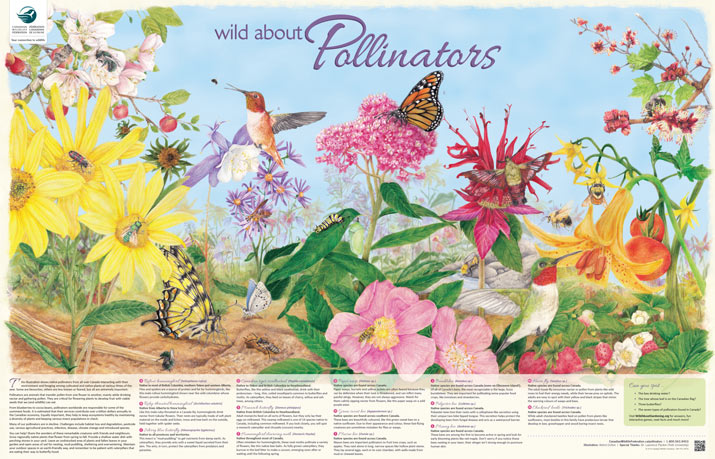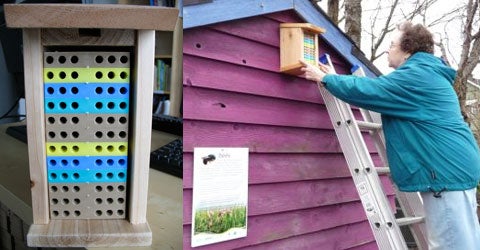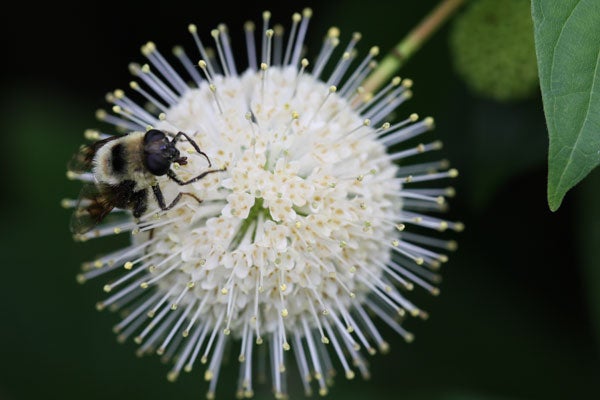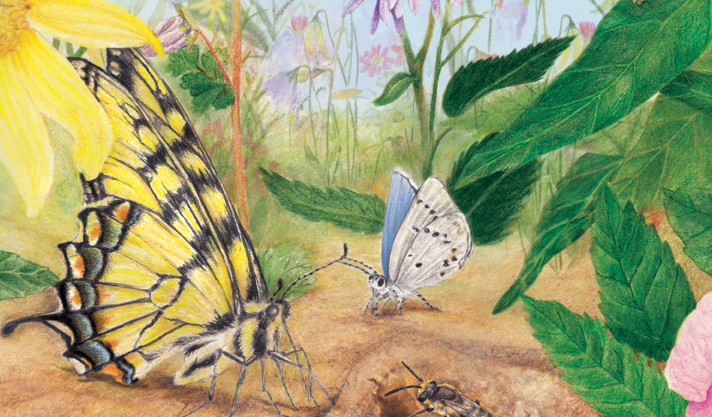
-
 WILD About Pollinators
WILD About PollinatorsWILD About Pollinators
This illustration shows native pollinators from all over Canada interacting with their environment and foraging among cultivated and native plants at various times of the year.
More
Listen carefully. It can happen under cover of night or in broad daylight. It can happen in the deep, dark forest or wide open fields. The birds know about it. So do the bees. It is one of the most important biological processes on our planet, yet it continues to be overlooked by many. Now it is time to expose one of the great secrets from the private life of plants ... pollination!
Celebrate Pollination and Pollinators
Join the Canadian Wildlife Federation and its partners as we pay homage to the age-old process of pollination, and to the pollinators — the host of insects, birds and other wildlife species — that make it happen.
Over the past 100 million years or so, pollination has moved seed producers to the evolutionary forefront of the plant kingdom, making them hugely successful in terms of adaptability, numbers, variety and value to humans. While the process has been humming along successfully for millions of years, it does not seem secure in these days of rapid environmental change. The honey bee, the “poster child” for pollination, currently appears to be afflicted by a virus. While scientists grapple with the honey bees’ problem, parasites, pesticides, changing climate and habitat loss are affecting other pollinators, too. Their collective capacity to perform this huge task is diminishing while our agriculture-related expectations of them increase. There appears to be trouble afoot.
Why Pollination Is Important
Did you know that pollination is one of the most important ecological processes on the planet? The basic transfer of pollen from the male parts of a plant to the female parts is vital for reproduction of about 90 per cent of the seed-producing plant species in the world. Pollination creates fertile seeds, and fertile seeds contain the promise of renewed life, year after year, generation after generation. Pollination is a fundamental function in ecosystems, and pollinators, which are often referred to as “keystone species” because many other species in their ecosystem depend on them, play a critical role. Indeed, without pollination, many plants could not reproduce. Food webs and, therefore, ecosystems would collapse. We would quickly run out of food, medicine, wood products — almost everything we and wildlife need to survive on this planet. Without pollination, the world as we know it would be a different place.
Go from awareness to action using these customized resources:
- The Science of Pollination Primer
Most seed-producers owe their great success, in part, to pollination. - Pollination Puzzles
Students decipher clues to match “flower” cards with pollinator agents. - Benefits and Values, Threats and Consequences
Consider these pollinator products and by-products. - Pollination By-Products
Students identify the plant origin for a number of common foods and find out which pollinating agent makes it possible. Older students also identify some of the threats to the processes of pollination. - Actions for a Healthy Planet
What’s being done, and how can you help? - Plant a Butterfly Garden
Students plant a school garden to provide habitat for butterflies and other pollinators. - BEE Courteous, BEE Safe
You may attract more than butterflies to your garden — other pollinators, such as bees, may also appreciate your efforts. - Curriculum Links Table
- Resources for Teachers
- 0
- 1
- 2









